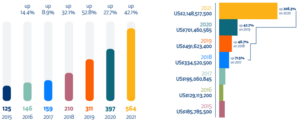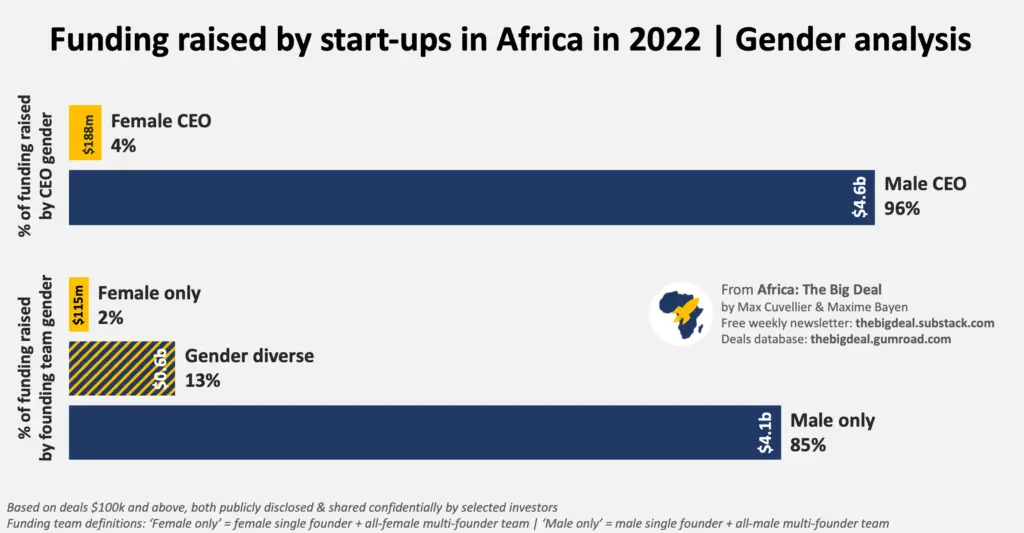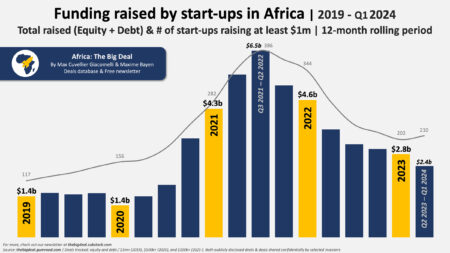- Female-led and female-founded ventures attracted even less funding in 2022 than they had in 2021.
- Female-led start-ups in Africa have raised $188m (4%) in 2022, while male-led ventures raised $4.6bn (96%).
- The number of $100k+ deals announced by female-led start-ups has also seen a YoY decrease, (128 in 2022 vs. 141 in 2021) and relatively (13% vs. 16%).
Female-led and female-founded ventures attracted even less funding in 2022 than they had in 2021, latest data from Africa’s The Big Deal shows.
According to the report, female-led start-ups in Africa have raised $188m (4%) in 2022, while male-led ventures raised $4.6bn (96%). In other words, 25x times less funding has been invested in female-led start-ups in 2022, compared to their male-led counterparts.
“Year-on-year, the amount of funding raised by female CEOs has decreased between 2021 and 2022, both in absolute ($188m in 2022 vs. $290m in 2021) and relative numbers (3.9 percent vs. 6.3 percent),” said Max Cuvellier Founder, Africa : The Big Deal.
According to Cuvellier, another cause for concern is the fact that the number of $100k+ deals announced by female-led start-ups has also seen a YoY decrease, absolutely (128 in 2022 vs. 141 in 2021) and relatively (13% vs. 16%).
The report reveals that female led startups improved in the second half of 2022 than in the first half. In the second half they raised 6 percent of funding compared to the first half, where they raised 2.8 percent of funding.
“The number of $100k+ saw the same upward trend with 15% of deals bagged by female CEOs in H2, up from 11% in H1,” the report continues.

Focusing on the gender profile of the founding teams, the report indicates that male-only founding teams (whether a single male founder or an all-male founding team) continued to attract the vast majority of funding in 2022: 85 percent , up from 83 percent in 2021.
“Female-only founding teams raised more in 2022 ($115m, 2.4%) than in 2021 ($44m, 0.9%) though this progress was somewhat canceled by a decrease of funding going to gender-diverse founding teams (from 16% in 2021 to 13% in 2022,” Cuvellier explains.
Interestingly, in terms of the number of $100k+ deals, the split was almost identical between 2021 and 2022: 73% male-only, 19% gender-diverse, 8% female-only, pointing to the slow building of a pipe of non male-only-founded start-ups for future funding.
“Worryingly though, in contrast to the numbers when it came to the gender of the CEO, the harder conditions in H2 translated into a further concentration of funding into male-only founding teams who raised 91% of all funding in H2, compared to 82 percent in H1,” Cuvellier concludes.
Why The Gender Disparity
A 2021 report by Briter Bridges revealed that only 3 percent of all the investments made into African startups between 2013 and 2021 went to female-led startups.
The report attributes the low numbers to lower pitching by female entrepreneurs who are less likely to pitch for equity financing.
The report observed that female startup founders are noticeably fewer in certain sectors like the fintech space, which is known to attract the most investments.
According to the report, female founders are more inclined to seek bank loans. Unfortunately, they hardly get any loans from the banks. Meanwhile, startups with all-male teams are most likely to attract both equity and debt financing.
The report also revealed that female startup founders are less confident in both their ability to pitch to investors and in their startups’ ability to grow. According to the report, this confidence gap exists even though a lot of the female founders are more educated than their male counterparts and even have better professional experiences.
The report concluded by noting that while it’s important to encourage the establishment of more female-led tech startups, it’s also equally as important to support female-led tech ventures which already exist.











